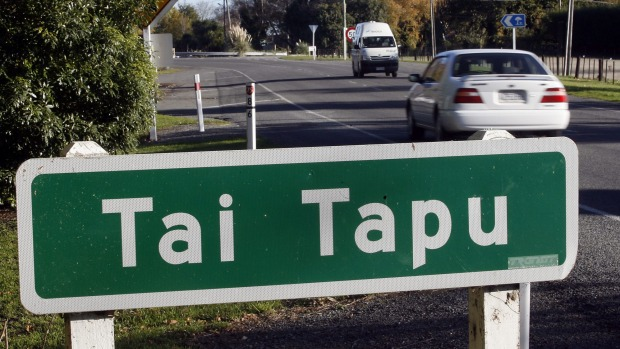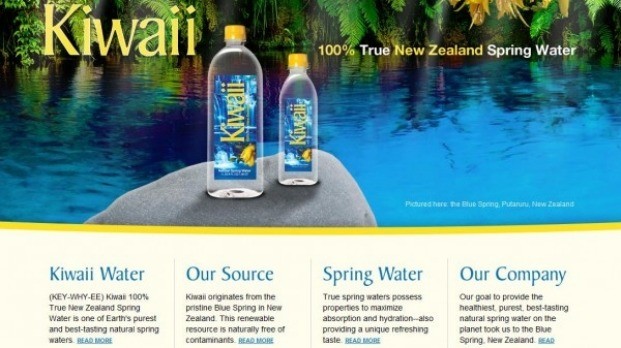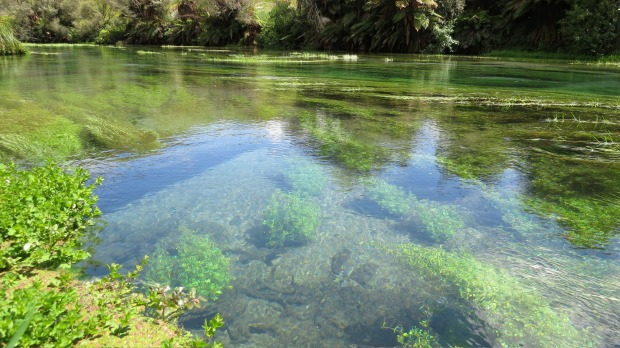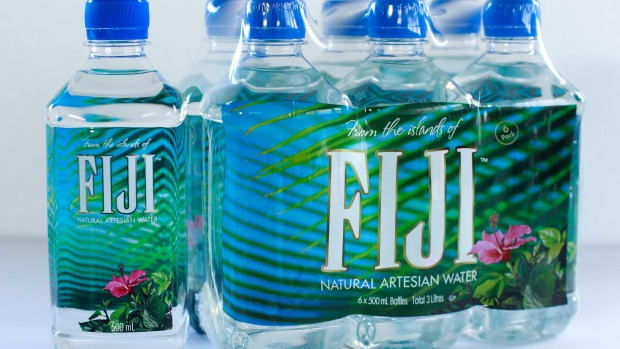 |
| Reviews and Templates for Expression We |
The bottled-water giants who are taking our water

Tai Tapu has a population of around 700.
The sale of the Ashburton District Council's Lot 9, which comes with resource consent to bottle 1.4 billion litres of artesian water each year, caused outrage - but the global beverage giants have been quietly bottling New Zealand's water for years CHARLIE MITCHELL reports.
Along a quiet, dusty road near rural Tai Tapu lies a nondescript water bottling-plant once backed by billionaires.
It's a corrugated iron structure, indistinguishable from the hay sheds scattered across the Canterbury Plains.

Kiwaii Water - made in NZ, but sold in US.
There is nothing to suggest it is connected to Lynda and Stewart Resnick, Americans with a fortune of about $6 billion.
The town, which has a population of about 700, was chosen as the site for a plant used by SpringFresh, a wholly-owned subsidiary of the Resnick-owned company Fiji Water.

The Putaruru Blue Spring.
It is one of the world's largest bottled water brands, said to be the drinking water of choice for many celebrities, including United States President Barack Obama.
The water bottled there was sold under the SpringFresh brand within New Zealand. The plant was sold to Naturally Pure NZ in 2013.
The sale of the Ashburton District Council's Lot 9, which comes with resource consent to bottle 1.4 billion litres of artesian water each year, caused outrage - but the global beverage giants have been quietly bottling New Zealand's water for years.

A subsidary of Fiji Water is behind the SpringFresh bottling plant in Tai Tapu.
At the blue spring near Putaruru in Waikato, a town with a population of about 4000, Coca-Cola (annual revenue over $60b) extracts water for its Pump brand.
In Kaiapoi, Japanese company Suntory Holdings (annual revenue over $30b), which owns Frucor, bottles its South Island sourced water for its H2Go and Mizone products.
Oravida bottles water in the Bay of Plenty; a Latvian company sells water under the Tongariro Springs brand.
Kiwaii water, sold in 40 US states, is American-owned, and Chinese-backed companies who sell water across Asia bottle their water in Hawke's Bay.
Billions of litres of water leave the country every year for sale overseas, driven by some of the world's largest companies, who do not pay a fee to use the resource.
While such activity is met with outrage by some, others say the beverage giants are making the most of an opportunity New Zealand should have taken long ago.
"Perhaps we should applaud overseas companies for doing what New Zealand should have done years ago - sell the water rather than turning it into milk, with its associated environmental impact," says Roger Young of Canterbury's Water Rights Trust.
The group has opposed dairy intensification in the region, due to its affect on the environment. Bottling the water itself was both economically viable and more environmentally friendly.
Dr Daniel Collins, a hydrologist, has estimated about 250 litres of freshwater goes into producing a litre of Canterbury milk, primarily from irrigation.
Bottled water, comparatively, is more simple: 1 litre of freshwater equals 1 litre of bottled water for sale.
"It just seems so obvious to cut out all the dirty stuff involved in milk powder production and sell the fresh water instead," Young says.
"Selling the water rather than [turning it into] milk powder is the smartest thing to do with a valuable resource."
Of the 11 consents that allow water bottling in Canterbury, Ashburton's Lot 9 is by far the largest to be used primarily for bottling. There is no central register for water-bottling companies in New Zealand, which means the total volume of water they take is unknown.
Based on publicly available information, however, it appears the Ashburton take is among the largest.
Dr Eric Crampton, head of research at the New Zealand Initiative, says there would be few complaints if that water consent was bought by a dairy farm.
He says bottling water is more efficient than using it for dairy, and suggested it may be time to "cut out the middle cow".
"If a dairy farmer bought [a property with a water consent] and profited from drawing that water to produce milk, nobody would bat an eyelash.
"Shifting to a trading mechanism would make sure that New Zealand water were put to its best use."
Such a trading mechanism, however, looks unlikely. In the wake of the Ashburton deal, the government has re-iterated its position that water is owned by no-one.
When the Ashburton District Council applied for its water consent, Environment Canterbury (ECan) knew fully well it planned to sell it on for commercial purposes.
Similarly, in 2015, there were protests against the Hawke's Bay regional council after it gave several overseas companies consent to bottle hundreds of millions of litres of water.
They approve such consents because they effectively have no choice not to, says Dr Bryan Jenkins, water expert at the University of Canterbury
The Resource Management Act (RMA) means local authorities are unable to allocate water on merit. They cannot take into account debates about socially acceptable usage of water, which flare up when overseas companies apply to take the water.
"If we're going to have sustainable management of water, we do need something quite different from the RMA," he says.
"There are countries with more modern legislation than the RMA, which are considering what are the uses of water that are considered to have the highest priority for a particular society."
Jenkins - himself a former chief executive of ECan - says while bottling water has fewer environmental implications than water used for dairy farms, each country has to decide how it wants its water used.
Unless the RMA is changed, the debate cannot happen.
"[Bottling] is a lower impact activity than using water for irrigation on things like dairy farms. Clearly you don't have the water quality implications of land use intensification you get with things like dairying.
"Whether the RMA is the appropriate basis for making such decisions is another matter."
|
|
|
|
Copyright remains with the original authors |